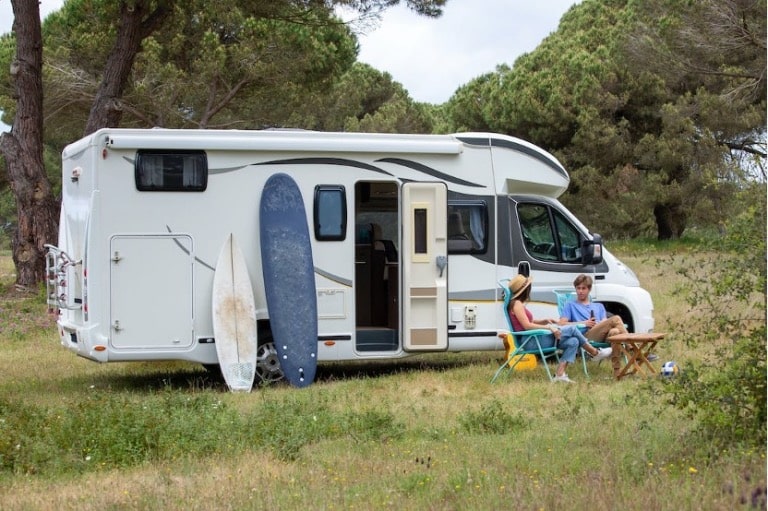Recreational vehicles (RVs) are often exempt from the usual insurance requirements that apply to other kinds of vehicles. Your current auto insurance coverage can cover towable recreational vehicles like campers, caravans, and travel trailers. However, if your RV is motorized, then having RV insurance is mandatory.
In this post, we’ll discuss the situations in which RV insurance is obligatory, as well as those in which it’s not required, but nonetheless recommended.
Do Recreational Vehicles Need Insurance?
You must have insurance if your RV has an engine and can be driven. RVs with engines are considered vehicles and hence need auto insurance. You are required to have a policy that has sufficient liability insurance to fulfill the minimal requirements in the region in which you live. If you want full protection for your motorhome, you should get comprehensive collision insurance.
Although you may not need additional insurance for your pull-behind RV, the protection provided by a standard car insurance policy has certain restrictions. The contents of a camper or travel trailer, for instance, are not protected by regular vehicle coverage. Fortunately, these drawbacks are fully compensable by RV insurance.
It is important to shop around and compare prices while searching for RV coverage. Make sure you choose a reputable brokerage that has a proven record of satisfied customers to help you find the best RV insurance for your needs and budget. The Allen Insurance Group, for instance, is a dynamic and innovative brokerage fully committed to offering you the finest service and solutions available. If something were to happen to your RV, partnering with a reputable business like theirs would ensure that you are taken care of.
Different Types of RV Insurance
Type A Coverage
This sort of insurance is designed specifically for recreational vehicles that are being driven to a certain location. Type A insurance protects against unexpected costs, as well as liability coverage, protection from all dangers, personal property, and a waiver of depreciation.
Type B Coverage
This type of recreational vehicle insurance provides supplemental protection that can be purchased for truck campers, as well as travel, tent, and fifth-wheel trailers. This insurance provides you with either comprehensive or collision protection.
Alternative Types of Rv Insurance Coverage
Emergency Roadside Service
Emergency roadside service coverage can assist you with a variety of roadside assistance services, including changing a flat tire, boosting a dead battery, towing your vehicle, and many more.
Emergency Vacation Expense
If a covered loss renders, your RV unusable, emergency expense coverage may reimburse you for the cost of your planned vacation. You may use the money to go home, continue your trip, or find a place to stay while your RV is being repaired.
Campsite Liability
If your RV causes property damage at a campground, you may be reimbursed for those repairs by the campground’s liability insurance. This kind of coverage is tailored to the needs of those who are going on primarily short trips. In fact, 24% of Canadian campers don’t go more than 50 kilometers from home when they go camping. If you fall into this category, you qualify for this type of insurance.
Personal Effects Replacement Coverage
Comprehensive coverage protects your RV against mechanical and aesthetic problems, as well as things integrated into your RV. Personal effects replacement coverage serves to give coverage for goods that are not built into your RV, such as TVs or closets. This sort of coverage may assist in paying the expenses of repairing or replacing things from within your RV that have been damaged or lost in a covered claim.
What Kind of RV Insurance Do You Need?

Choosing the best recreational vehicle insurance for you will depend on several factors, such as:
Distance Traveled
You put your recreational vehicle in more danger when driving it about, than if it was parked or stored. So, if you have a bunch of trips planned for the summer, you’ll need to take more precautions to protect yourself fully.
Usage and Location
You may require different insurance depending on how frequently and when you want to use your recreational vehicle. You’ll still need insurance whether you park your RV at the same campsite all summer, hop around to different ones, or use it infrequently.
Be sure to let your insurance agent know if you intend to drive your RV outside of your province of residency to avoid any coverage gaps.
RV Furnishings
You could be more inclined to have expensive possessions with you if you make your RV your primary residence. It’s best to travel light, but if you must bring along pricey equipment, TVs, cameras, bicycles, or furniture, be sure your insurance policy has you covered.
Final Thoughts
Having recreational vehicle insurance before hitting the road will ease your mind. While accidents can’t be predicted, you still need to be prepared for them. When you have RV insurance, you can rest easy knowing that you and your investment are protected.